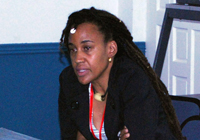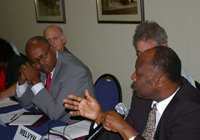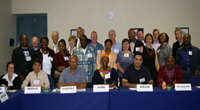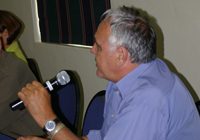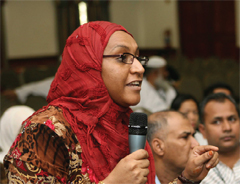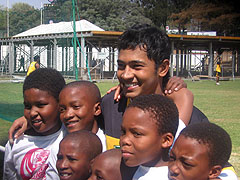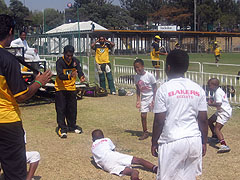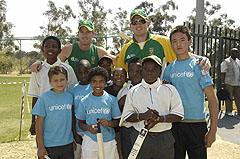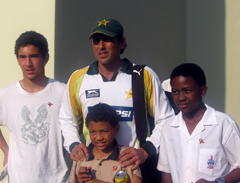UNAIDS is working in partnership with NAM to provide news reports on key scientific findings and other important developments from the 38th World Lung Health Conference, taking place in Cape Town, South Africa from 8-12 November.
All stories featured here below were written by NAM and housed on the NAM web site.
200,000 die each year because world still failing to treat HIV and TB together
HIV programmes are still failing to integrate TB prevention and care into their work, and TB remains the biggest killer among HIV-positive people as a result, experts and advocates said on the opening day of the 38 th World Lung Health conference in Cape Town.
“If we screened all people living with HIV for TB, we could save thousands of lives,” said Dr Alasdair Reid, TB/HIV Liaison at UNAIDS.
To read the full news report, go to http://www.aidsmap.com/en/news/EB1B111D-F861-4F76-8AA1-40FD572044D8.asp
Focus on MDR TB threat
The growing problem of multi-drug resistant (MDR) tuberculosis threatens to derail TB control efforts unless there is greater investment in control and diagnosis, TB experts warned this week in the run-up to the 38 th World Lung Health conference, which opened on Friday in Cape Town, South Africa.
This year’s conference is taking place in South Africa in order to highlight the growing challenge of drug-resistant tuberculosis in the regions of the world most seriously affected by HIV.
Last year’s discovery of an outbreak of extensively drug-resistant TB among HIV-positive patients in the rural KwaZulu Natal town of Tugela Ferry rocked the worlds of TB and HIV treatment, and highlighted the need for greater integration of TB and HIV care.
“XDR TB is a wake-up call to ensure a better future of HIV treatment by strengthening TB control,” said Dr Haileyesus Getahun of the World Health Organization Stop TB department, speaking at a workshop on XDR and MDR TB in the context of HIV, organised by the Treatment Action Group and the Stop TB Partnership.
To read an extended report on MDR and XDR TB from the 38 th World Lung Health Conference in Cape Town, go to http://www.aidsmap.com/en/news/40A6BE12-72BC-4B9E-ACBE-9348DD330091.asp
Key scientific findings from the conference:
Tugela Ferry XDR TB outbreak continues to grow
Two hundred and sixty-six people in the South African town of Tugela Ferry have now been diagnosed with XDR TB in the world’s largest outbreak of extensively drug-resistant TB. A further 205 cases of MDR have also been discovered, and eight staff at the Church of Scotland Hospital, Tugela Ferry, have died of MDR or XDR TB. Eight-four per cent of all XDR TB patients have died, Dr Tony Moll reported.
Southern Africa becoming MDR hot-spot
Re-analysis of MDR TB reports by Dr Ruth McNerney of the London School of Hygiene, using available data, shows that ten out of 20 regions with the highest incidence of MDR TB per 100,000 inhabitants are in southern Africa, and eight of ten are in South Africa. The highest incidence was found in the Karakalpakistan district of Uzbekistan (35 cases per 100,000), with Kazakhstan ranked second (22 per 100,000), and four provinces of South Africa (Limpopo, North-West, Mpumalanga and KwaZulu-Natal) reported 1 – 15 cases per 100,000 notifications.
Dr McNerney noted that although MDR TB cases comprised a low proportion of total TB cases in the region, the population incidence was nevertheless high.
MDR TB risk elevated in HIV-positive TB cases in Ukraine
An analysis of all TB cases in the southern Ukraine district of Donetsk, a large industrial city also seriously affected by HIV, has found that among 1293 consecutive TB patients diagnosed smear-positive between July 2005 and June 2006, 15.5% of those diagnosed with TB for the first-time had MDR TB. Among those previously treated for TB, 41.5% had multi-drug resistant TB.
The Ukrainian researchers found that 21% of their TB patients were HIV-positive, and that the rate of MDR TB was significantly higher in HIV-positive patients, who had a 50% higher risk of being diagnosed with MDR TB as their first TB infection.
Intensified case finding of TB cases in people with HIV: look for multiple symptoms
Studies from Cambodia and Ethiopia suggest that encouraging health providers to look for a range of symptoms, rather than just cough, may yield a higher rate of TB case identification in HIV-positive people.
Research in Cambodia reported by Dr Michael Kimerling and Dr Kevin Corn found that a cough lasting three weeks was a less sensitive predictor of TB than prolonged fever and sudden weight loss within the previous month, while research in Ethiopia found that screening only for cough would miss 56% of cases in HIV-positive people.
Current WHO guidelines for identification of smear-negative TB (which is more common in HIV-positive people) recommend looking for a number of symptoms, including cough, prolonged fever, weight loss, night sweats and swollen lymph nodes. Symptoms other than cough may be particularly important indicators of TB in patients with extrapulmonary TB (outside the lungs), which is also more common in HIV-positive people.
MDR death rates lowest in South Africa where patient-centred approaches followed
Patients in the North-West province of South Africa have the lowest risk of death from MDR TB when compared to the rest of the country, probably due to a patient-centred treatment approach, a national survey has found. Incentives such as nutritional support, transport to visit the MDR treatment centre after follow-up, a dedicated transport network for MDR patients and active follow-up for defaulters resulted in a 9.5-fold lower risk of death compared with Eastern Cape province, and 4.2-fold lower risk of death compared to Gauteng.
HIV-positive MDR patients, regardless of their location in South Africa, were 3.6 times more likely to die, and those with ofloxacin resistance 4.2 times more likely to die. All differences were statistically significant.
Link:
Read more on the conference
Visit the oficial web site 



